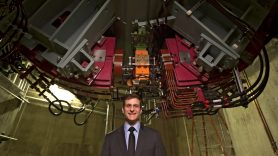- Diseases
- Acoustic Neuroma (14)
- Adrenal Gland Tumor (24)
- Anal Cancer (68)
- Anemia (2)
- Appendix Cancer (16)
- Bile Duct Cancer (26)
- Bladder Cancer (72)
- Brain Metastases (28)
- Brain Tumor (232)
- Breast Cancer (714)
- Breast Implant-Associated Anaplastic Large Cell Lymphoma (2)
- Cancer of Unknown Primary (4)
- Carcinoid Tumor (8)
- Cervical Cancer (158)
- Colon Cancer (166)
- Colorectal Cancer (118)
- Endocrine Tumor (4)
- Esophageal Cancer (44)
- Eye Cancer (36)
- Fallopian Tube Cancer (8)
- Germ Cell Tumor (4)
- Gestational Trophoblastic Disease (2)
- Head and Neck Cancer (12)
- Kidney Cancer (128)
- Leukemia (342)
- Liver Cancer (50)
- Lung Cancer (286)
- Lymphoma (278)
- Mesothelioma (14)
- Metastasis (30)
- Multiple Myeloma (100)
- Myelodysplastic Syndrome (60)
- Myeloproliferative Neoplasm (6)
- Neuroendocrine Tumors (16)
- Oral Cancer (100)
- Ovarian Cancer (172)
- Pancreatic Cancer (160)
- Parathyroid Disease (2)
- Penile Cancer (14)
- Pituitary Tumor (6)
- Prostate Cancer (146)
- Rectal Cancer (58)
- Renal Medullary Carcinoma (6)
- Salivary Gland Cancer (14)
- Sarcoma (238)
- Skin Cancer (296)
- Skull Base Tumors (56)
- Spinal Tumor (12)
- Stomach Cancer (64)
- Testicular Cancer (28)
- Throat Cancer (92)
- Thymoma (6)
- Thyroid Cancer (98)
- Tonsil Cancer (30)
- Uterine Cancer (80)
- Vaginal Cancer (16)
- Vulvar Cancer (20)
- Cancer Topic
- Adolescent and Young Adult Cancer Issues (20)
- Advance Care Planning (10)
- Biostatistics (2)
- Blood Donation (18)
- Bone Health (8)
- COVID-19 (362)
- Cancer Recurrence (120)
- Childhood Cancer Issues (120)
- Clinical Trials (632)
- Complementary Integrative Medicine (22)
- Cytogenetics (2)
- DNA Methylation (4)
- Diagnosis (232)
- Epigenetics (6)
- Fertility (62)
- Follow-up Guidelines (2)
- Health Disparities (14)
- Hereditary Cancer Syndromes (126)
- Immunology (18)
- Li-Fraumeni Syndrome (8)
- Mental Health (116)
- Molecular Diagnostics (8)
- Pain Management (62)
- Palliative Care (8)
- Pathology (10)
- Physical Therapy (18)
- Pregnancy (18)
- Prevention (918)
- Research (392)
- Second Opinion (74)
- Sexuality (16)
- Side Effects (604)
- Sleep Disorders (10)
- Stem Cell Transplantation Cellular Therapy (216)
- Support (402)
- Survivorship (322)
- Symptoms (182)
- Treatment (1786)
Proton Therapy Center: Eight years of progress and promise for cancer treatment
3 minute read | Published May 02, 2014
Medically Reviewed | Last reviewed by an MD Anderson Cancer Center medical professional on May 02, 2014
As the MD Anderson Proton Therapy Center marks its eighth year, we have a lot to celebrate. We've made phenomenal progress, and we're standing on the forefront of an extremely exciting time in cancer treatment.
A cancer diagnosis is a life-changing event. Thanks to the advances in technology, research and science behind proton therapy, we are changing the way that people around the world fight cancer. As new breakthroughs are pioneered at MD Anderson, cancer patients everywhere stand to benefit from a new standard of cancer care.
Proton therapy, a form of external beam radiation that uses protons instead of photons (i.e., X-rays) to treat tumors, is developing by quantum leaps, as we continue to expand our understanding of the science and technology behind it. We're discovering cancer treatment methods that are more effective and less toxic than we could have imagined eight years ago.
Back then, we treated only pediatric and prostate cancers with protons. Now, we've treated more than 5,000 patients for an array of tumors. In addition, we've pioneered new ways of doing things and conducted pivotal research.
IMPT changes the game
One of most exciting developments over the past few years is intensity-modulated proton therapy (IMPT). This type of treatment delivers a precise dose of protons to tumors, making it ideal for treating tumors that are complicated or difficult to reach. MD Anderson was influential in developing this method, which evolved from pencil beam technology.
We're witnessing a period of true technological innovation, and IMPT represents the most advanced delivery of radiation to date. What makes it exciting is we are treating a variety of cancers, including lung cancer, pediatric cancers, head and neck cancers and gastrointestinal cancers. In essence, any tumor that can be treated with any other type of radiation can be treated with IMPT.
Learning from proton therapy clinical trials
At this juncture, research is more important than ever. We are involved in clinical trials for proton therapy treatment of several types of cancers. All of our pediatric patients are enrolled in prospective trials. In fact, every patient is offered a clinical trial, either to monitor long-term effects or to compare proton and photon therapies.
One of the most intriguing trials is a randomized phase two/three study comparing toxicities and side-effects of IMPT and intensity-modulated radiation therapy (IMRT) for patients with untreated, advanced oropharyngeal cancer, a type of throat cancer which is quickly becoming epidemic in this country, in part because of the human papillomavirus (HPV).
MD Anderson physicians have published more than 100 articles, advancing proton therapy radiation, but we have a lot more to learn.
We are involved in a pioneering trial incorporating novel MRI techniques to help us differentiate the effects of proton and photon therapies, ultimately using imaging biomarkers to help predict outcomes and toxicity.
The next eight years: The future of proton therapy
Any developing technology needs to be harnessed, protected, and given time and space to grow. As one of the leading proton therapy centers, we aim to do this responsibly. We will continue to enroll patients in studies and report data in a timely fashion. That's one way we can make a significant contribution.
Through looking at costs and outcomes, we'll be able to demonstrate proton therapy's value. It will show a clear advantage in some disease sites, where it should be used systematically. We aim to define the role of proton therapy in every disease site, then communicate to the world when to use protons and when not to use protons. In addition, we plan to increase our scanning beam technology, which allows us to do IMPT, in the near future.
At MD Anderson, we are always looking toward the future, and we're excited for the possibilities proton therapy holds for Making Cancer History®.
Related Cancerwise Stories

We're excited for the possibilities proton therapy holds for Making Cancer History®.
Steven J. Frank, M.D.
Physician





